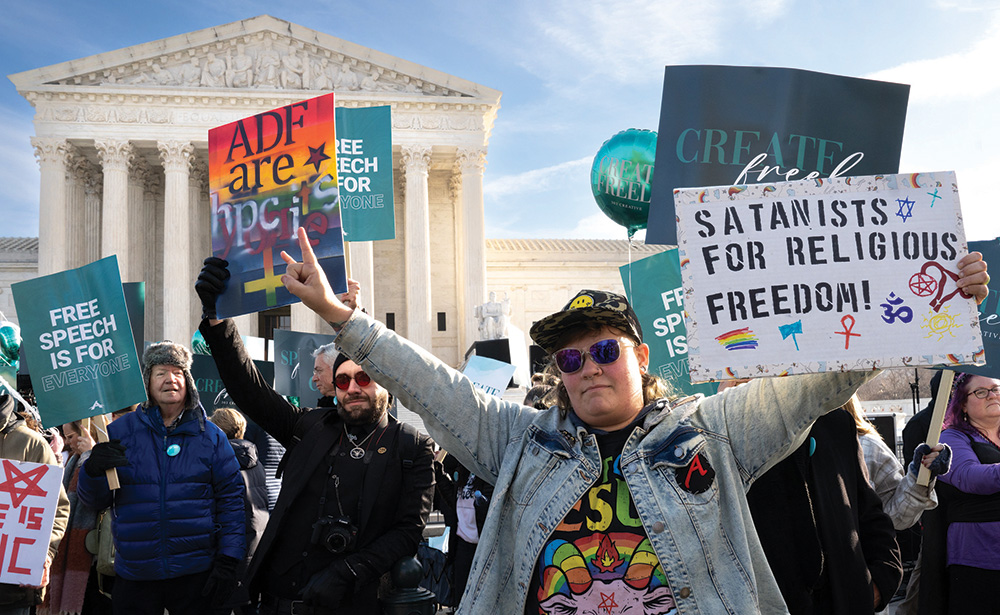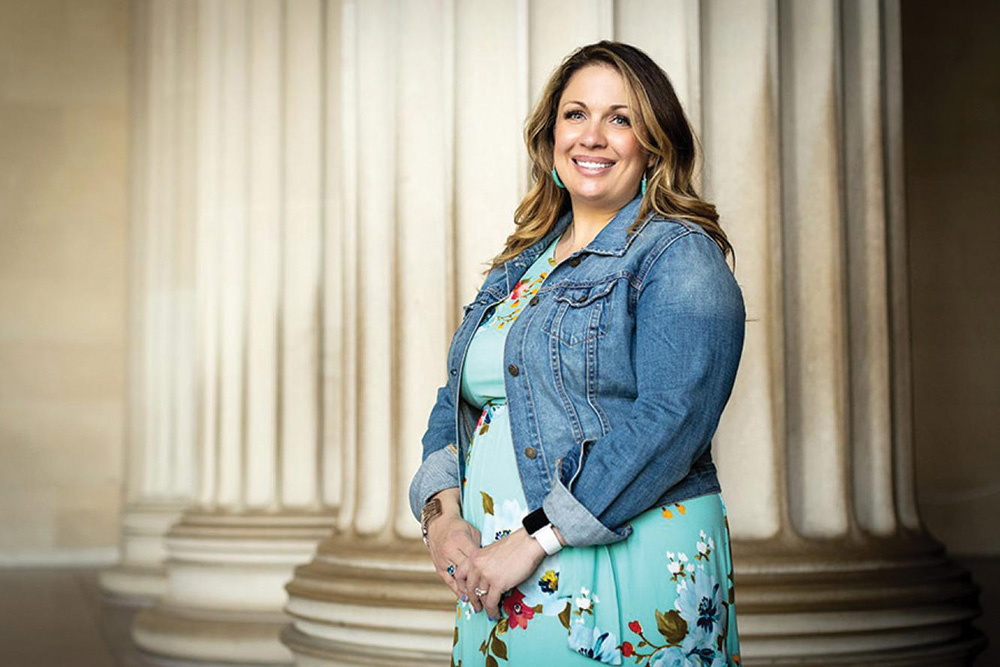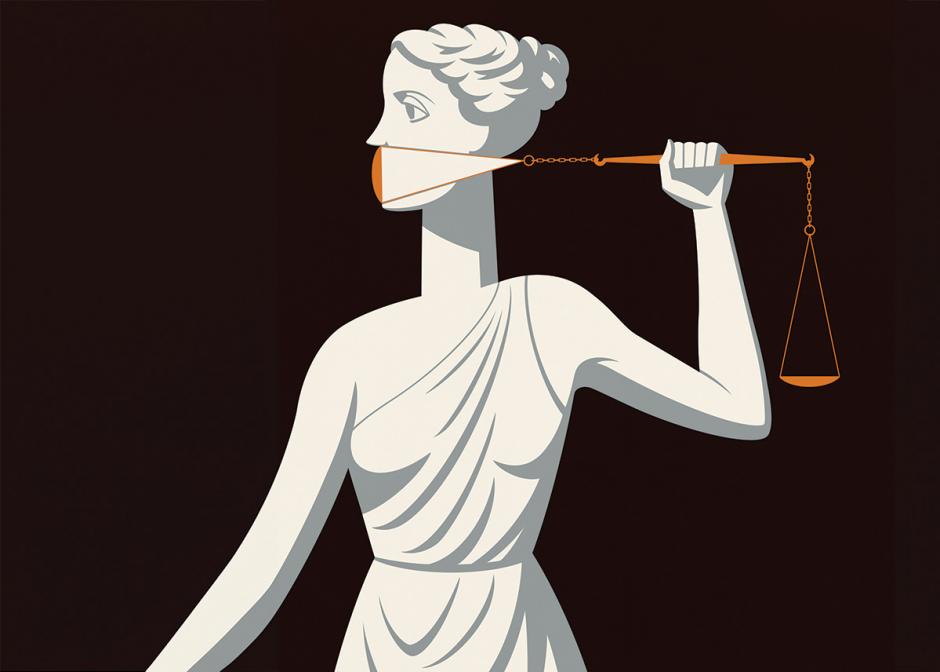A Right to Remain Silent
Michael D. Peabody November/December 2023The Supreme Court case of 303 Creative v. Elenis was cast as a standoff between religious free exercise and LGBTQ+ nondiscrimination. But what did the Court really decide?
Illustration by Jon Krause
In those wretched countries where a man cannot call his tongue his own, he can scarce call anything else his own.—John Trenchard and Thomas Gordon, as quoted by Benjamin Franklin in The New-England Courant, July 9, 1722.
Freedom of speech has never been more celebrated or feared than it is on the internet, where anyone can wax eloquent on any topic with the entire world as an audience. After Elon Musk bought Twitter, presumably to reduce censorship of “false” political and scientific opinions, many flocked to Mark Zuckerberg’s new Threads app, looking for safety from the “danger” of unfettered speech.
To be sure, the internet is still something of a Wild West, with international scam artists and pornographers equal clicks away from churches, government offices, blue chip commercial enterprises, artists, and writers.
And it is in this crazy marketplace of ideas that Colorado artist and website designer Lorie Smith decided to set up her business, 303 Creative. Smith wanted to create custom websites for betrothed couples and whoever else walked through her digital doorway. She did not care about her customers’ racial, religious, or sexual identity. The only caveat was that she did not want to apply her design and writing skills to creating wedding websites for couples that did not consist of one man and one woman. She based this on her own religious convictions, which she attributes to her Christian beliefs.
The State of Colorado responded with a hard “no.” The state said that if Smith made websites for anyone, she had to make websites for everyone. In fact, if she were to refuse, Smith would be fined up to $500 for every violation and could be subject to “mandatory remedial training.” And so, Smith sued.
As to Smith’s legal right to bring an action, which some have disputed, there was no question that Colorado intended to enforce the law against Smith, and thus she had standing to sue. In fact, in its decision, the Tenth Circuit Court of Appeals spent 10 pages agreeing with the lower court’s opinion (which had granted summary judgment against Smith) holding that Smith had established a “credible threat of enforcement.” Legal standing was not an issue in this case, despite it being the subject of many amicus briefs and media articles. When it comes to fundamental constitutional rights, one need not wait until the hammer of the government is brought down before protesting a credible threat.

A Narrower Focus
While this case had an undeniable religious component, the lower courts had found that Colorado’s Anti-Discrimination Act (“CADA”) was a “neutral law of general applicability.” If the Supreme Court had agreed to hear this case on free exercise of religion grounds, it would not only have had to address the issue of free speech, but also potentially dismantle a 1990 precedent set in Employment Division v. Smith. In that case, the Court had rendered the free exercise of religion a much weaker clause than its First Amendment neighbor, the free speech clause.
The Tenth Circuit set up 303 Creative well for the Supreme Court by determining that this was a “pure speech” case rather than being about an expressive activity. The Circuit found that CADA’s accommodation clause required Lorie Smith to “speak” by making these websites. Therefore, if she refused to make wedding websites for same-sex couples, she would also have to refuse to make websites for heterosexual couples.
The Tenth Circuit applied a strict scrutiny analysis to the Colorado law and found, first, that it did promote a “compelling government interest” in “protecting both the dignity interests of marginalized groups and their material interests in accessing the commercial marketplace.” Second, the court found that CADA was narrowly tailored to meet that interest.
By calling 303 Creative a “pure speech” case, the Tenth Circuit created an ideal vehicle for addressing the free speech issue. With all due respect to the Masterpiece Cakeshop wedding cake cases—and scores of Netflix cake shows—this case was undeniably about artwork and written communications. The Court did not need to consider what part of a wedding cake is “art” and what part is simply cake.
Although the free speech issue was the key focus of the Court’s decision, the religious issue is also relevant since that is the context in which this case arose. When it comes to religious freedom arguments, people are often tempted to address the theological position of the person asserting the freedom. For instance, those who keep a Sabbath might compare their beliefs about what constitutes “necessary work” with the beliefs of other Sabbathkeepers. One person may draw the line at optional airline travel, while another may believe that driving a car is prohibited.
Since we’re talking about religious beliefs, you might be saying, “Well, stop right there. I’m a Christian, and I would be honored to make a wedding website for a same-sex couple. For me, it’s not even a religious question, and Smith’s position makes no logical sense.”
But the Supreme Court has been very reluctant to define what constitutes a “religious” belief or practice because people have a wide range of beliefs and practices. In Thomas v. Review Bd., Ind. Empl. Sec. Div. 450 U.S. 707 (1981), the Court noted that “religious beliefs need not be acceptable, logical, consistent, or comprehensible to others in order to merit First Amendment protection.”

To Speak or Not to Speak
Most of the time, people think of free speech as the right to say things. But the Supreme Court has also recognized the principle that the government cannot force an individual or group to say certain things. This is called the “compelled speech doctrine.” In a 1943 case, West Virginia State Board of Education v. Barnette, the Court decided that the state had unlawfully expelled Jehovah’s Witness students for refusing to follow a state law requiring them to pledge allegiance to the flag. In Barnette, the Court also noted that the fact that the students had refused for religious reasons was not a controlling factor and it was not necessary to ask about the sincerity of their religious beliefs. The mere fact that the state compelled the speech was sufficient to violate the First Amendment, even if it was acting to strengthen “national unity.”
It is important to understand the scope of the 303 Creative decision. Because this case was decided on a “pure speech” basis, it will likely apply to writers, artists, or others who practice highly customized communicative works. Because the decision involves free speech and is not centralized around a religious view, it will apply to all who have personal reasons to refuse to develop creative works for individuals or groups they find objectionable. Had the case gone the other way, a Democrat could have been required to design posters for a group of minority Trump supporters, or web designers could have been required to create websites for religious groups that they find objectionable.
There are few easy answers to cases in which the rights of some come into direct conflict with the rights of others, but in 303 Creative, the Constitutional right to freedom of speech emerged as strong as it has ever been.
Article Author: Michael D. Peabody
Michael D. Peabody is an attorney in Los Angeles, California. He has practiced in the fields of workers compensation and employment law, including workplace discrimination and wrongful termination. He is a frequent contributor to Liberty magazine and editsReligiousLiberty.TV, an independent website dedicated to celebrating liberty of conscience. Mr. Peabody is a favorite guest on Liberty’s weekly radio show, “Lifequest Liberty.”
